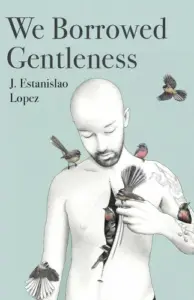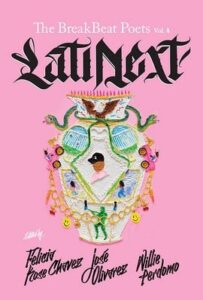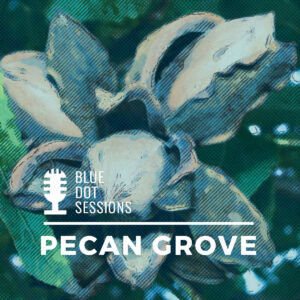J. Estanislao Lopez
Alternate Ending: The Escape of Jephthah’s Daughter
Old stories — of mythology or religion — have sometimes been depicted as having one narrative and one interpretation. Here, J. Estanislao Lopez takes on the voice of a character whose story ended in violence, inviting listeners to claim their agency as this character claims hers.
We’re pleased to offer J. Estanislao Lopez’s poem, and invite you to connect with Poetry Unbound throughout this season.

Image by Annisa Hale/ Film processed by Moody's Film Lab, © All Rights Reserved.
Guest

J. Estanislao Lopez is the author of We Borrowed Gentleness (Alice James Books, 2022). His poetry has appeared in The New Yorker, Ploughshares, The Rumpus, and Poetry Magazine, as well as the anthology The BreakBeat Poets Vol. 4: LatiNext. Lopez received his MFA from the Warren Wilson Program for Writers.
Transcript
Transcription by Alletta Cooper
[music: “Praise the Rain” by Gautam Srikishan]
Pádraig Ó Tuama: My name is Pádraig Ó Tuama, and when I was growing up I heard a lot of stories about Hell, and in my teens and twenties as well. And Hell was often used as a threat to people like me, gay people who’d end up burning in Hell for eternity. And one of the things that changed for me was to go into Hell and to go, there’s interesting things to learn. There’s poetry about Hell. There’s language about Hell, and Hell can be a place of discovery through the imagination, through literature, through mythology. There’s so much to learn about Hell that can be embraced, that can almost be playful, too. And going into Hell was a great protest against those who told me I’d spend eternity there.
“Alternate Ending: The Escape of Jephthah’s Daughter” by J. Estanislao Lopez
Seeing my father tear his clothes at the sight of me,
each seam of cloth unspindling to reveal his bare,
flexing chest as he wailed a heartfelt regret,
I could no longer take him seriously. God,
I realized, played favorites and favored fools.
Who did he think would walk through the door
to greet him? The irony!—I could hear the future
exclaim. And a virgin sacrifice, at that!
But I’m no archetype. I fled to the mountains,
promising return, but what is a promise if not
an exchange of ideas about ourselves, subject
to evolving circumstances? If my nation burns, so be it.
Many will be grateful. And there’s no lack of men
eager to sing of how they suffered greatly and prevailed.
[music: “Angel Tooth” by Blue Dot Sessions]
This poem’s title makes a specific reference to somebody’s daughter, and therefore, with that you can often think, do I need to know the story in order to appreciate the poem? And of course, knowing the story might help. But often when I don’t know the story, I want to look at the poem before researching the story in order to think, what does the poem know and what does the poem tell me?
And from the title, you know that this is an alternate ending and it’s about a woman whose name we’re not given, and she’s the daughter of somebody called Jephthah. And so there’s some information there immediately. But the “alternate ending” is also interesting, to say that whatever this is, it’s a reclamation or a little revolution or an insertion or maybe even some kind of poem of protest to say: there’s a story that goes one way, and here’s a poem about it going another way.
So we know that there’s a female voice speaking. She’s watching her “father tear his clothes at the sight of me.” That’s the opening line. And you have “the seam of cloth” unspindles there and he’s left bare. And I see sorrow, I see fury, I see frenzy.
So there’s some story of split that’s happening in this poem between the speaker of the poem, Jephthah’s daughter, and her father, but also her father’s God. “I could no longer take him seriously.” And she doesn’t take her father seriously anymore or the religion that he’s part of. So what we have here is despite whether you do or don’t know the mythological or narrative background to the poem, what we have here is a poem of protest and a poem of somebody saying: there’s a story that I’m not taking anymore. I’m creating my own.
[music: “Tripoli” by Blue Dot Sessions]
This poem is written from the point of view of somebody who is absolutely clear about what she thinks. And it’s looking at the impact that a fool with power can have on his perceptive daughter. And from the title, we know that this is a poem about escape, a powerful word in the poem.
I’m always curious when I read a poem about why it needs to be written. And for me, I’m curious in this poem about what is it that the poet needed to write that is a) about this story, whoever Jephthah’s daughter is, but b) about the human necessity to take a story — maybe a trope or an archetypal story — and to upend it, to change it. What is it about that when we’re held to the power of somebody else’s word over us, somebody else making decisions for us? This is a poem for people in all kinds of circumstances to say: you do not need to be beholden to a story that’s going to repeat, and repeat, and repeat.
This is a sonnet, it’s a 14-line poem, and typically a sonnet has a turn in the middle of it, a volta, you call it in Italian. And this poem has a powerful volta: “But I’m no archetype” is what she says. Such brilliant assertion. There is no self-doubt in this poem. She’s not feeling guilty, she’s not feeling laden. And this is a sonnet that turns on itself and says: there’s a predictable story that I’m being forced into and I’m leaving it. I am not beholden to somebody else’s promises about me, somebody else’s decisions for me.
And this is a myth that speaks back to a myth and undoes the myth. It’s an archetypal character rejecting the role of an archetype. And I love the power of that because I find myself thinking, “What are the archetypal characters in my mythology or in my religion, or in the story of my life? And what would it be like to be emboldened by some of the confidence of the speaker to say: I’m changing the story.”
[music: “Creatures of Myth” by Gautam Srikishan]
The story of Jephthah’s daughter is a biblical story. Jephthah, though, was a warrior, and he had something to prove, and he made a vow to God saying: Whoever comes out of the doors of my house to meet me when I return victorious from the battle, they shall be the lords to be offered up by me as a “burnt offering.” It’s from the book of Judges. It’s an extraordinarily powerful line.
And Jephthah only had one child. And the biblical account says that when she heard him coming back from the battle that she came out of the house adorned and dancing to celebrate his victory. And then his happiness turned to horror when he saw that it was her.
And so hence the strength of Jephthah’s daughter’s line when she says, “Who did he think would walk through the door // to greet him?” Now, there is an important question, a long-term question, as to whether he was saying that he’d offer her up as a burnt offering or whether he would offer her to the service of God for the rest of her life in some kind of vow of isolation and a Nazirite vow.
But what’s important to know is that whether this is a story about sacrifice — and he would’ve been breaking all of the conventions of Judaism to offer anybody as a sacrifice, there’s no human sacrifice in Judaism — or whether he’s saying, “Okay, I’ll give you up to this kind of vow that you’ll be serving God in a particular way.” Her life was not his to make a promise about. Her life was her own. And that, I think, is what the protest of the poem is. I think J. Estanislao Lopez is really deft in understanding, look, this narrative from the Bible has been interpreted in different ways, but actually, the promise was never his to make.
And part of the intellectual premise of this poem is the line when she says, “But what is a promise if not // an exchange of ideas about ourselves, subject / to evolving circumstances?” She’s saying: You should have changed your circumstances when you saw me. I’m not going to be part of whatever it is that you think you’re doing, whoever it is you think you’re keeping happy. She’s saying, “There’s no lack of men / eager to sing of how they suffered greatly and prevailed.” And quietly in that is to say: I won’t be one of them. And the invitation of the voice of this poem is to say: where is it that other people are making choices for your life, and what might it be like to take the power, the verve, the strength, the lack of self-hatred in her voice where she says, I’m more interested in something else. I’m interested in survival. I’m leaving.
[music: “Thread Caramb” by Blue Dot Sessions]
There’s such delicious alliteration in “God, // I realized, played favorites and favored fools.” “Favorites.” “Favored fools.” There’s an implication of swearing in that. It’s the way that you have to put your lip against your teeth and force air through your mouth to say those Fs after each other. And you can hear the energy of this speaker. You can hear that she genuinely has lost respect for anybody who would make a promise about her life that is not theirs to make: “I could no longer take him seriously.”
There’s just something about this poem. There’s something about the voice in it that is so clear, like it’s almost like the poet isn’t even in the way. [laughs] I kind of feel like this voice of Jephthah’s daughter arrived through J. Estanislao Lopez and almost pushed him out of the side, too, to say, “I have something to say.” And he was the ink by which Jepthah’s daughter wrote this poem. I love that and I love the invitation to so many of us, whether it’s a story from religion or culture or mythology or nationality or politics, that has been an oppressive story that’s forced people into a lack of imagination about their future. I love the artistry of this poem to say: Rewrite it. Give us an alternate ending. Show us what’s possible if we listen to the voice that should have been listened to in the first place. And that’s the way that this poem has this huge invitation to people inside and outside of the knowing of whatever this particular story is. This poem is saying: What would it be like to reimagine? What would it be like to change?
[music: “Into the Earth” by Gautam Srikishan]
“Alternate Ending: The Escape of Jephthah’s Daughter” by J. Estanislao Lopez
Seeing my father tear his clothes at the sight of me,
each seam of cloth unspindling to reveal his bare,
flexing chest as he wailed a heartfelt regret,
I could no longer take him seriously. God,
I realized, played favorites and favorite fools.
Who did he think would walk through the door
to greet him? The irony!—I could hear the future
exclaim. And a virgin sacrifice, at that!
But I’m no archetype. I fled to the mountains,
promising return, but what is a promise if not
an exchange of ideas about ourselves, subject
to evolving circumstances? If my nation burns, so be it.
Many will be grateful. And there’s no lack of men
eager to sing of how they suffered greatly and prevailed.
[music: “Praise the Rain” by Gautam Srikishan]
Chris Heagle: “Alternate Ending: The Escape of Jephthah’s Daughter” comes from J. Estanislao Lopez’s book We Borrowed Gentleness. Thank you to Alice James Books who gave us permission to use J. Estanislao Lopez’s poem. Read it on our website at onbeing.org.
[music: “Praise the Rain” by Gautam Srikishan]
Poetry Unbound is: Gautam Srikishan, Eddie Gonzalez, Lilian Vo, Lucas Johnson, Amy Chatelaine, Kayla Edwards, Annisa Hale, and me, Chris Heagle.
Our music is composed and provided by Gautam Srikishan and Blue Dot Sessions.
This podcast is produced by On Being Studios, which is located on Dakota land. Open your world to poetry with us by subscribing to our Substack newsletter. You may also enjoy Pádraig’s new book, Poetry Unbound: 50 Poems to Open Your World. For links and to find out more visit poetryunbound.org.
Books & Music
Recommended Reading
The On Being Project is an affiliate partner of Bookshop.org and Amazon.com. Any earnings we receive through these affiliate partnerships go into directly supporting The On Being Project.













Reflections